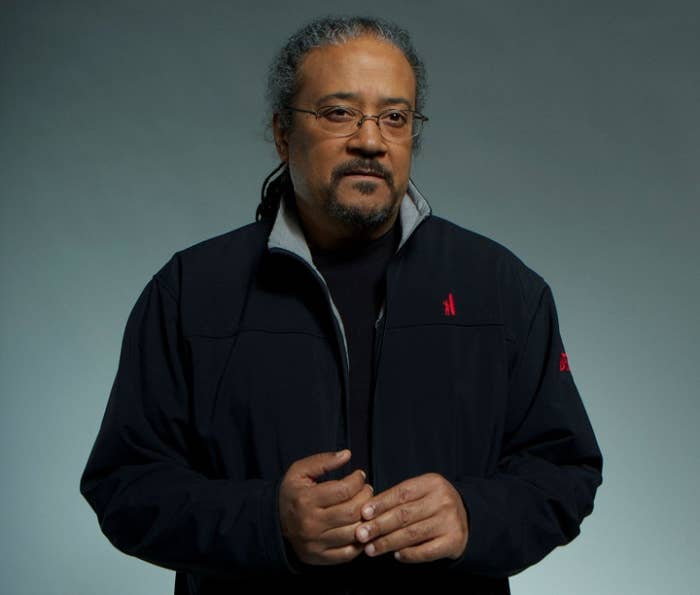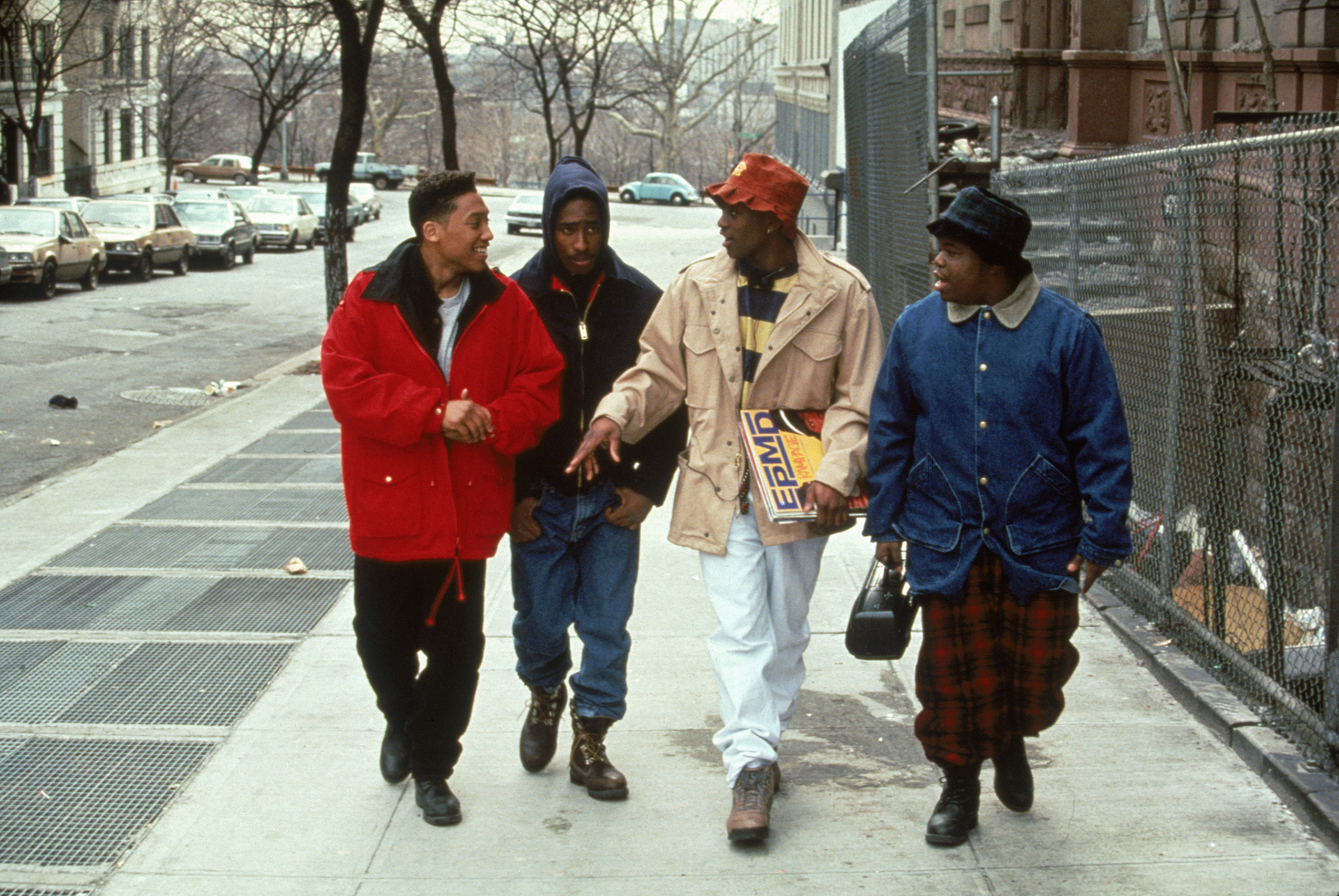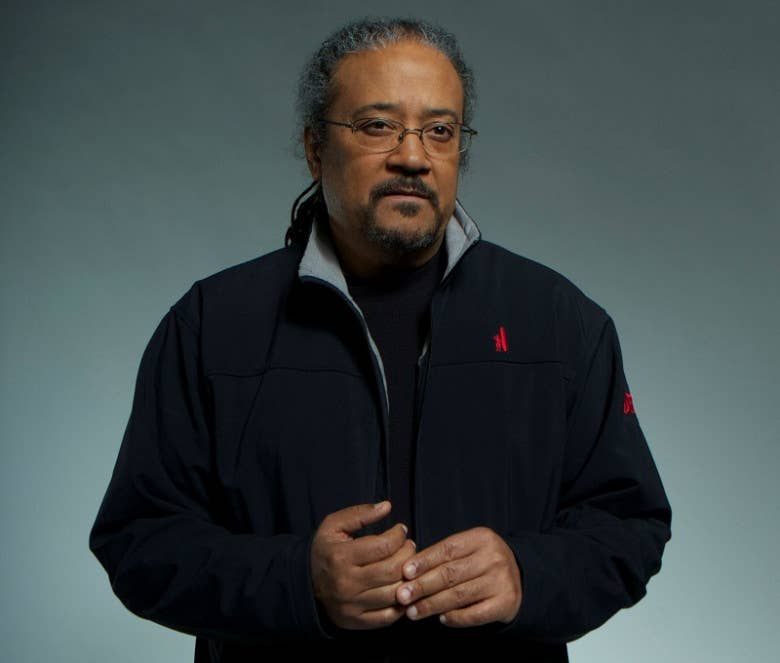
Monday, Jan. 17, 2022, is an interesting day: not only is it the federal holiday that the United States of America has set aside to remember the life and legacy of Martin Luther King Jr., but its also the birthday of Muhammad Ali and Betty White. It’s wild that those who know will also set aside two hours that day to rewatch Juice (1992), the New York City-set hood classic that was the feature-length directorial debut for the iconic Ernest R. Dickerson—who went from being an in-demand cinematographer to directing everything from Bones to episodes of The Wire, Dexter, and Godfather of Harlem—as well as being the acting debut of the late Tupac Shakur.
Juice told the tale of four high schoolers—Bishop (Shakur), Q (Omar Epps), Raheem (Khalil Kain), and Steel (Jermaine Hopkins)—who cut class and get into all kinds of trouble in the Big Apple. One fateful night, everything changes, thrusting this tale of hood violence and self-destruction against a bombastic hip-hop soundtrack that blew my mind the first time I pressed play and heard the opening loops of Eric B. and Rakim's "Juice (Know the Ledge)." It immediately stood out to a Jersey-born and bread knucklehead like myself (and Dickerson, who is from Newark, New Jersey), because it felt like my coast. Boyz n the Hood made a huge splash in the summer of 1991, and while I understood the overall story, the streets of Los Angeles moved a bit differently than the streets of New York City—Harlem to be exact. What I didn’t know was that the story that became Juice (which Dickerson wrote alongside Gerard Brown) had been gestating since the ‘80s.
“Juice was written when I was still trying to find work as a still photographer,” Dickerson told Complex via phone. “Gerard Brown and I wrote Juice around 1980, 1981, which was about nine years before we were actually able to get the film made.” During that time, Dickerson picked up work in—including his cinematography work that I’d seen in classic Spike Lee joints like Do the Right Thing and School Daze, the very places I’d initially seen Dickerson’s name. All this time, Brown and Dickerson still wanted to get Juice made. “When we tried to sell it, nobody wanted to buy it. Everybody said, ‘Nobody wants to see this movie,’ so it wound up sitting on the shelf for many years.” Dickerson remembers that it wasn’t until Brown’s new agent at the time had asked to see some of his older work and, after reading the script for Juice, garnered interest in the film, with one catch: “they wanted to turn it into a comedy.” The studios also had a list of directors that they wanted to handle the project, killing the writer-director tandem that Dickerson and Brown had already set themselves up to be.
“They had a list of directors three pages long and mine was the last name on the last page,” Dickerson explains. “They wanted to buy the script—I love Malcolm Jamal Warner, but they wanted Malcolm because he was on The Cosby Show. Gerard and I, we’re getting these notes that we needed to lighten it up, make it more of a coming-of-age comedy in Harlem because it was already too dark. We said, ‘No, we don’t want to do that,’ and we basically said, ‘Thank you,’ and we took the script. We could have made a lot of money just selling it, but we took it back. We said, ‘Forget about this. We don’t want to have this. They want to turn this into something we don’t want our names on.’”
View this video on YouTube
Juice eventually got a studio behind it, and the original vision for the story of the crew at the center of this story was maintained. It’s remembered for being a “hip-hop movie,” and for good reason. Juice’s score was created by Hank Shocklee and The Bomb Squad, who were most known for their groundbreaking production work with Public Enemy, instrumental (no pun intended) in creating a sound that was as dense and sharp as Chuck D’s rhymes. “I’m not a religious follower of hip-hop,” Dickerson admits, “but Public Enemy was a group that I always really loved, and I wanted the creator of that sound” for Juice. [Ed. Note: This wasn’t be the first time Dickerson worked with Public Enemy; he directed the video for “Fight the Power,” the jam from Lee’s aforementioned Do the Right Thing.]
In 1992, Shocklee spoke on Juice having the “first true contemporary African-American movie score,” which made sense when you’re telling a story about Black youth in Harlem in the early ‘90s. Dickerson says that hip-hop was always a part of Juice, though. “I didn’t want Q to be a rapper,” Dickerson says, “because that just seemed easy. I wanted him to be a musician, and being a young man in Harlem, not able to necessarily afford musical instruments, he made his own instruments using discs and being a DJ. That’s something that I discovered earlier on and I was fascinated by it. The idea [of] coming up with this new type of music through scratching just fascinated me. Actually, in the original script—in the movie, it’s Queen Latifah who is the judge [of the DJ competition Q is in], but in the original script, it was Afrika Bambaataa. When we were going to do the movie, Afrika was not available, but then we found out that Latifah was available and she’s my homegirl from Newark, New Jersey.” [Ed Note: Dickerson worked with Latifah on Spike Lee’s Jungle Fever, which Dickerson says he had just worked on right before shooting for Juice started.]
View this video on YouTube
Latifah wasn’t the only rapper bringing authenticity to Juice, though; her homeboy and fellow Jersey native Treach from Naughty by Nature was also in a small role, although he did audition for the role of the film’s main villain, Bishop, with 2Pac. Pac’s audition blew everyone else away, and Dickerson shared that another scene highlighting Pac’s acting ability—when Q and Bishop are having an argument after learning of Blizzard’s death—“That scene was actually shot on the first day of shooting,” Dickerson remembers.
“We had the guys spend time together,” Dickerson explains. “The four guys spent a lot of time together. There was not a lot of actual rehearsal time, but we had a chance to see what Pac was capable of. I think everybody wanted to come out of the box with their A-game. Tupac and Omar, Khalil, and Jermaine, they really click. When I was casting the film, I narrowed the cast out to like 12 possibilities and then I did mixes and matches because I was trying to find the four personalities that together could create a fifth person, which was the group mind, the group brain, the group soul.” The Wrecking Crew, if you will.
Dickerson says that ‘Pac won the role of Bishop because “a lot of guys who auditioned for Bishop came in thinking that all I have to do is go ballistic and show some anger and that’ll get me the role, but when we found him, one of the things that he tapped in on was the pain that Bishop feels. Where does all that anger come from? It comes from pain. It comes from a deep-seated pain and ‘Pac tapped in on that. That’s why he got the gig. And that’s the thing that he knew about Bishop, that a lot of young men who express this anger, it comes from pain. It comes from a deep-seated feeling of insecurity about them and their lives, and he captured that.”
And while we’re on the subject of acting in Juice, Dickerson also confirmed one deep-seated notion that I’d been holding for a bit: Samuel L. Jackson and Oran “Juice” Jones” freestyled that “snappy nappy dugout” scene. “That was definitely improvised. When I was talking with Sam, there was a saying that I had heard that I didn’t want use. ‘Putting your sneakers in the oven don’t make them biscuits.’ I said, ‘I want you to say something like that. I don’t want to say that exactly because I don’t want be quoting that, but with that same kind of sentiment.’ And he came up with, ‘Putting syrup on shit don’t make them pancakes.’ So he came up with that and Oran “Juice” Jones came up with ‘snappy nappy dugout.’ That was all improvised. Those guys did that. They improvised that whole thing. Sam improvised a lot of his stuff. Even the ‘You done slid down a razor blade and landed in an alcohol river,’ that was Sam.”



![Juice eventually got a studio behind it, and the original vision for the story of the crew at the center of this story was maintained. It’s remembered for being a “hip-hop movie,” and for good reason. Juice’s score was created by Hank Shocklee and The Bomb Squad, who were most known for their groundbreaking production work with Public Enemy, instrumental (no pun intended) in creating a sound that was as dense and sharp as Chuck D’s rhymes. “I’m not a religious follower of hip-hop,” Dickerson admits, “but Public Enemy was a group that I always really loved, and I wanted the creator of that sound” for Juice. [Ed. Note: This wasn’t be the first time Dickerson worked with Public Enemy; he directed the video for “Fight the Power,” the jam from Lee’s aforementioned Do the Right Thing.]
In 1992, Shocklee spoke on Juice having the “first true contemporary African-American movie score,” which made sense when you’re telling a story about Black youth in Harlem in the early ‘90s. Dickerson says that hip-hop was always a part of Juice, though. “I didn’t want Q to be a rapper,” Dickerson says, “because that just seemed easy. I wanted him to be a musician, and being a young man in Harlem, not able to necessarily afford musical instruments, he made his own instruments using discs and being a DJ. That’s something that I discovered earlier on and I was fascinated by it. The idea [of] coming up with this new type of music through scratching just fascinated me. Actually, in the original script—in the movie, it’s Queen Latifah who is the judge [of the DJ competition Q is in], but in the original script, it was Afrika Bambaataa. When we were going to do the movie, Afrika was not available, but then we found out that Latifah was available and she’s my homegirl from Newark, New Jersey.” [Ed Note: Dickerson worked with Latifah on Spike Lee’s Jungle Fever, which Dickerson says he had just worked on right before shooting for Juice started.]](https://img.youtube.com/vi/8b1jfsKFu2w/mqdefault.jpg)
